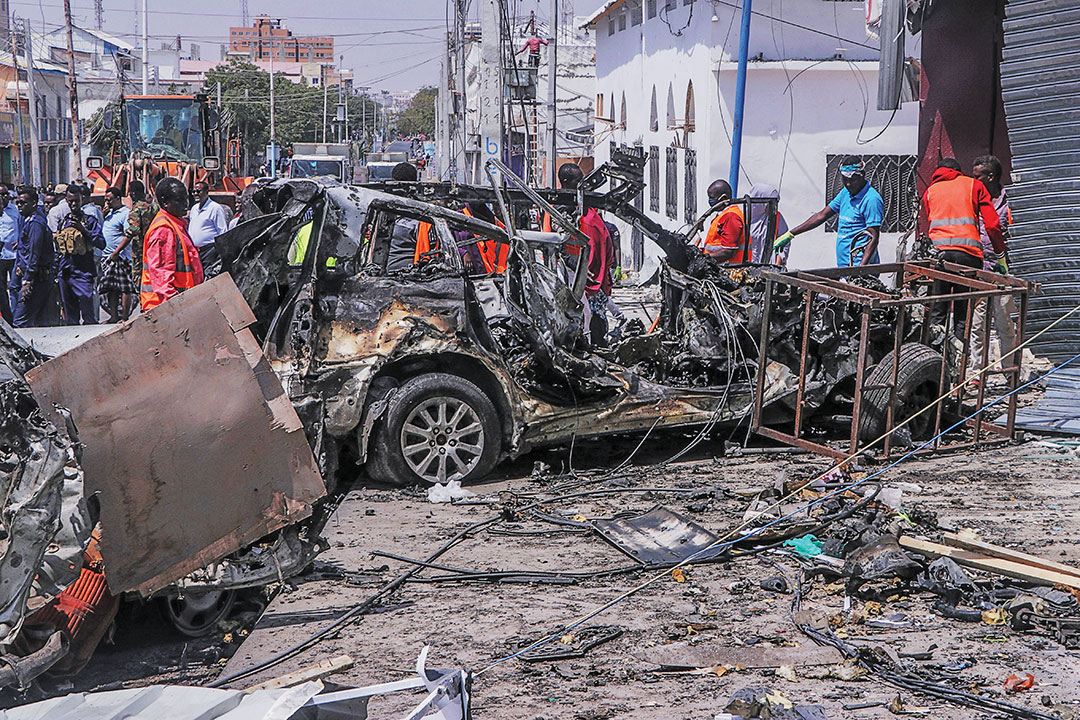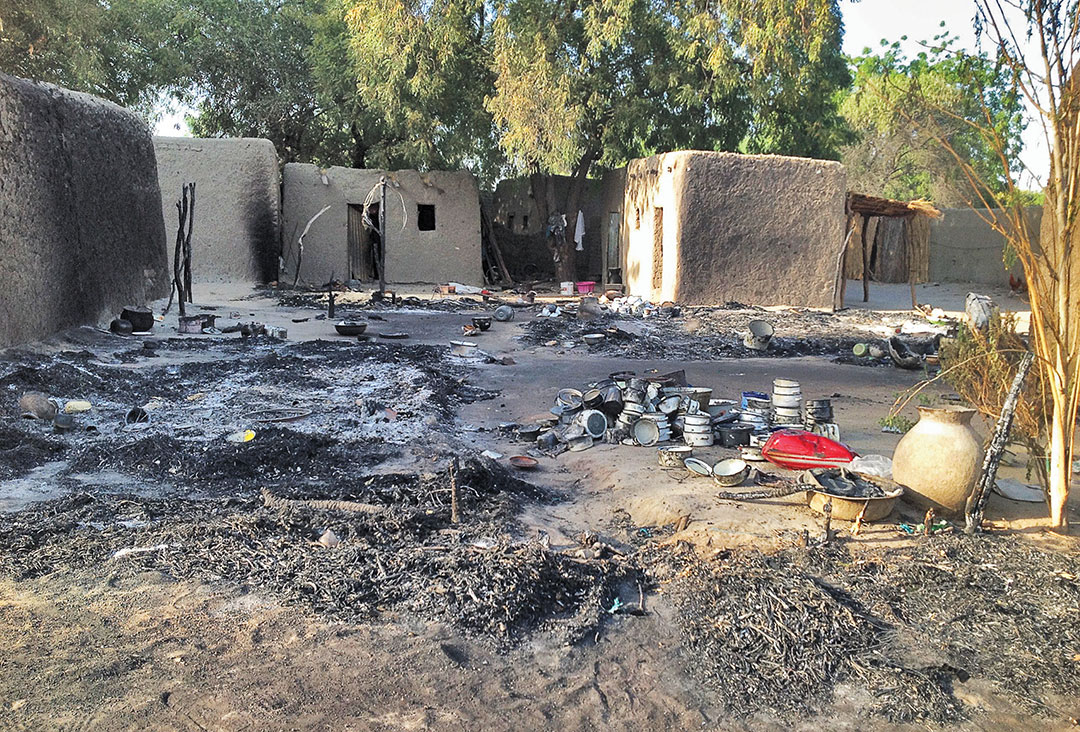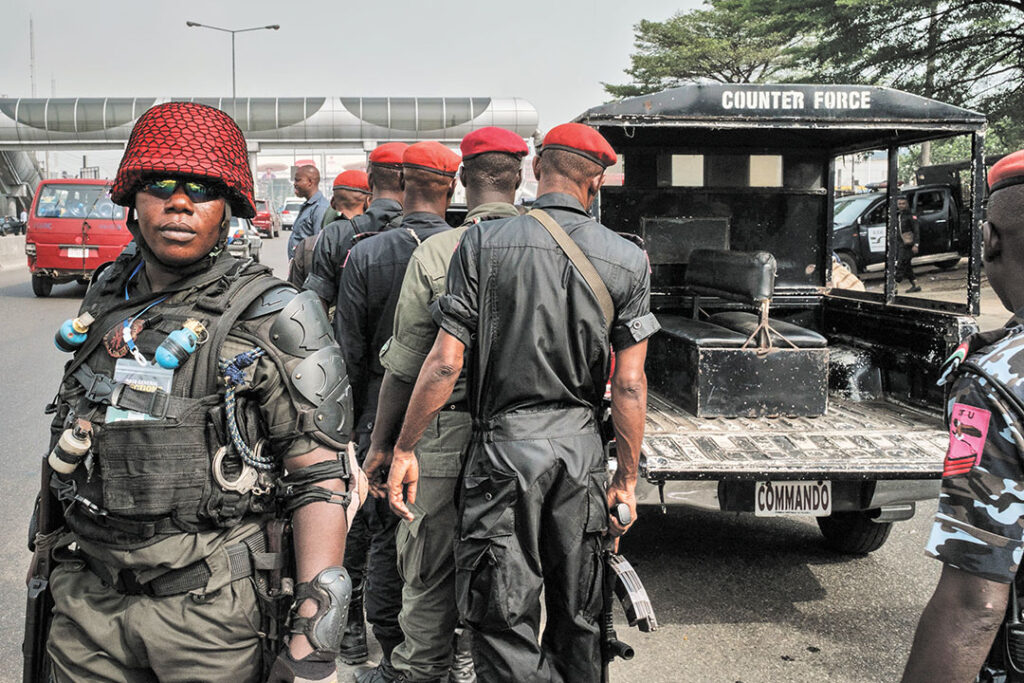Photos by AFP/Getty Images
Africa has by far the youngest population among the continents, with about 40% of its population — nearly 600 million people — 15 or younger. It’s the primary target audience for militant groups, and one of many reasons that experts say extremism in Africa has been so difficult to defeat.
“Terrorist groups are finding a vulnerable, impressionable population to target,” Professor Barend Prinsloo told ADF. “Attacks on villages often involve the murder of older individuals, while young people are either physically taken captive or mentally indoctrinated. This massive, youthful demographic provides a virtually endless supply of recruits.”
Prinsloo, program leader in international and national security at South Africa’s North-West University, described terror groups as opportunistic organizations that exploit any societal grievances they can find.
In Mozambique’s Cabo Delgado province, an Islamic State group (IS) affiliate has gained traction by taking advantage of political neglect of the region. In the restive eastern provinces of the Democratic Republic of the Congo, multiple extremist groups have posed as “liberation fighters.”
“In Somalia, al-Shabaab blends nationalistic ideas with its Islamist objectives,” Prinsloo said. “And in West Africa, jihadist groups find support by rejecting foreign influence, especially from former colonial powers.”
Caleb Weiss, an analyst for the Foundation for Defense of Democracies and the Bridgeway Foundation, said violent extremist groups are resilient because they belong to an ideological movement. Their leaders are skilled at taking religious messages and directives intended for a global audience and adapting them to local contexts. Local grievances are easily co-opted to entice recruits.
“A lot of what jihadist groups do on the ground is essentially public relations campaigns, what they call da’wah (Arabic for invitation), which helps build public support and further ingrain themselves into local environments,” Weiss told ADF. “Pure counterterrorism campaigns can rarely kill their way out of this problem as a result.”
Prinsloo explained why a military-only approach to counterterrorism has struggled to win the hearts and minds of the people affected by terrorist groups.
“Terror groups rely on asymmetrical warfare, disregarding conventional rules of human rights, which causes terrorism in Africa to increasingly resemble a civil war,” he said. “This dynamic amplifies the extremist ideology it began with, turning the conflict into a deeply personal, morally charged struggle for many of these young fighters.”

New Alliances
Militant groups continue to evolve in how they are funded. Often their goals align with locals and groups involved in illicit trade and organized crime. All parties empower and enable each other to achieve their goals, Prinsloo said.
“Their motives often center on resources and funding — recruiting people, controlling commodities and, increasingly, holding territory while acting like a quasi government,” he said. “In this space, transnational organized crime syndicates become the suppliers and facilitators for these terror groups.”
African terrorist group financing sources have remained largely unchanged in recent years: illegal taxation, looting, extortion, front businesses, kidnappings for ransom and donations.
“Those are still incredibly commonplace,” Weiss said. “What has evolved is more the methods of laundering and moving money. Yes, the old tried-and-true hawala [money transfer] networks and mobile money accounts are still very active in moving the money, but stuff like cryptocurrencies has gained popularity.”
Aligning with bandit groups in central Nigeria has allowed a Boko Haram splinter group to remain relevant and operational. But kidnappings and attacks have revealed that financing is at the heart of the alliance. James Barnett, a Hudson Institute research fellow in Nigeria, said local people no longer can distinguish between bandits and terrorists.
“Given what is already known about the nature of banditry in Nigeria, it seems likely that the militant landscape along the Niger-Kaduna axis is somewhat fractured, involving multiple armed groups whose motivations might vary and whose alliances might shift,” Barnett wrote in an investigation for HumAngle, an Abuja-based online daily newspaper that focuses on insecurity.
A New Threat
After a regional workshop in Rwanda to counter terrorist activities on the internet, United Nations officials said that some terrorist groups have learned to exploit virtual space to their advantage. “With time, some have mastered it to create a sophisticated and sprawling online presence — to radicalize, recruit, ransom, and raise funds,” the U.N. said.
“Countering terrorist use of the internet is increasingly difficult as terrorists are migrating to more niche and hidden parts of the internet, making their activity harder to identify and disrupt,” said Charley Gleeson, open source intelligence analyst at Tech Against Terrorism, a global initiative. “Which is why it can only be done effectively with collaboration between the tech sector, governments, and civil society to ensure that human rights and democratic freedoms are upheld.”
Officials at the workshop said that regional cooperation will be necessary to fight cyberterrorism.
“The fight against the use of the internet for terrorist purposes could not be won by one single country,” said Isabel Kalinhangabo of the Rwanda Investigation Bureau.
Experts now warn that extremists are in the early stages of turning to cyberterrorism using computers and networks for political, ideological or other objectives. The extremists are employing advanced attacks to gain access to networks, where they can stay undetected to steal data. They use computer viruses, worms and malware to target IT systems, power grids, transportation systems and more. They use social engineering strategies and phishing campaigns to trick people into disclosing valuable information.
A 2024 study showed that developing nations, especially those in Africa, are being used as test beds for cyberattacks because of their relatively low levels of computer security. In 2023, the average number of weekly cyberattacks on African businesses grew 23% compared to previous years, the fastest increase worldwide, according to Interpol’s 2024 African Cyberthreat Assessment. Ransomware and business email compromise topped the list of serious threats.
Digital illiteracy, aging infrastructure and a lack of security professionals all present challenges to preventing economic loss due to cybercrime, according to a 2024 report by Access Partnership and the Centre for Human Rights at the University of Pretoria.
“Africa faces the most significant impact from cyber threats compared to any other continent,” said Nicole Isaac, vice president of global public policy for technology giant Cisco. The cybersecurity newsletter Dark Reading reported that she said nearly all financial leaders in Africa “consider cybercrime a significant threat along with macroeconomic conditions and political and social instability.”
Disturbing Data
At a 2024 counterterrorism summit in Abuja, African Union Chairperson Mousa Mahamat highlighted some sobering numbers — an average of eight incidents and 44 fatalities a day on the continent in 2023. There were more than 16,000 deaths, including more than 7,000 civilians and more than 4,000 security forces.
“Terrorism and violent extremism are the biggest evils of our time, spreading to all the five regions of Africa,” he said.
Threats posed by violent extremist organizations on the continent are constantly evolving, as the two most prominent — al-Qaida and the IS — exploit “a deficit in counterterrorism capabilities,” according to a 2024 report by a panel of U.N. experts. “The situation is becoming ever more complex with the conflation of ethnic and regional disputes with the agenda and operations of these groups,” they wrote.
During the summit, United Nations Deputy Secretary-General Amina J. Mohammed called on countries in and around Africa’s violent hot spots to work with the U.N. and other international organizations to address root causes of terrorism such as the lack of economic opportunities. She added that African governments must reestablish their “social contract” or connection with communities and people.
Professor Prinsloo is among the experts who believe opportunities for dialogue with extremist groups should be explored.
“Respectful, formal governmental engagement with certain terrorist groups may offer a pathway to reduce the personal grievances at the core of this violence, allowing us to focus more effectively on addressing the extremist ideology itself,” he said.
Terror Expands in Regional Hot Spots
In recent years, five regions in Africa have been the focus of extremist violence, according to an August 2024 report by the Africa Center for Strategic Studies (ACSS):
THE SAHEL: The region with the fewest deaths 10 years ago has had the most over the past three years.
“The 11,200 deaths in the Sahel [through June 30] in 2024 — a tripling since 2021 — now represent over half of all reported fatalities across the continent,” the center reported. “Security force violence against civilians has consistently been found to propel recruitment by violent extremist groups. The Sahelian military juntas and their militia allies have killed more civilians (2,430) in the past year than militant Islamist groups (2,050).”
U.N. experts point to “a deficit in counterterrorism capabilities,” which al-Qaida and Islamic State group (IS) affiliates continue to exploit.
SOMALIA: Al-Shabaab has endured for two decades and has made this struggling country the second-most active battlefield on the continent for the past three years. The 6,590 reported fatalities in 2024 are more than double that of 2020, the center wrote. Al-Shabaab remains an overwhelming presence in Somalia, as the IS-Somalia group accounted for less than 1% of terrorism in Somalia and Kenya in 2024.
Despite significant losses from airstrikes and military operations, al-Shabaab remains resilient. It has an estimated 7,000 to 12,000 fighters and collects $100 million a year, mostly from taxation in Mogadishu and southern Somalia, U.N. experts wrote.

LAKE CHAD BASIN: A decade ago, this region was the epicenter of terrorist violence in Africa with 67% of all deaths, or 13,670 annually, according to the ACSS. The basin comprises northeast Nigeria and the borderlands of Cameroon, Niger and Chad.
“Militant Islamist violence in the Lake Chad Basin has ebbed and flowed over the past decade,” the center said. “The past two years have seen an increase in violent events after a period of decline. However, annual fatalities linked to these events have remained relatively consistent, typically ranging from 3,500 to 3,800 deaths.”
The International Institute for Strategic Studies (IISS) reports that the extremist insurrection in the Lake Chad Basin is mostly centered on Nigeria. Ansaru, an al-Qaida-affiliated group, and the IS-West Africa Province are the two dominant groups in the region. Attacks increasingly involve several nonextremist militias that take part in banditry, kidnapping and cattle rustling. The IISS says these militias “are now more lethal than jihadist groups.”
MOZAMBIQUE: The northern Cabo Delgado province has watched in horror as a local insurgency that emerged in 2017 has evolved into the deadly IS-Mozambique group. Multinational military operations have degraded the group’s capabilities, but violent events and fatalities have rebounded.
“The projected 250 events and 460 fatalities by the end of 2024 would represent a near doubling in violence over the previous year,” the ACSS wrote.
The IISS reports that northern Mozambique saw a new outbreak of militant activities in rural areas in 2022, after a decrease in violence after 2021 interventions by Rwandan and Southern African troops, who managed to push out militants from major towns in Cabo Delgado.
NORTH AFRICA: From June 30, 2014, to June 30, 2015, there were 3,650 fatalities from terrorism in North Africa, second most on the continent. Now, this region has the fewest reported deaths of the five.
“This year marks the first year there were no violent events linked to militant Islamist groups in Egypt since 2010,” the ACSS wrote. “The United Nations believes ISL (Islamic State-Libya) and al-Qaida still have fighters in the southern part of the country, though they appear to be focused on profiting from the illicit economy.”

